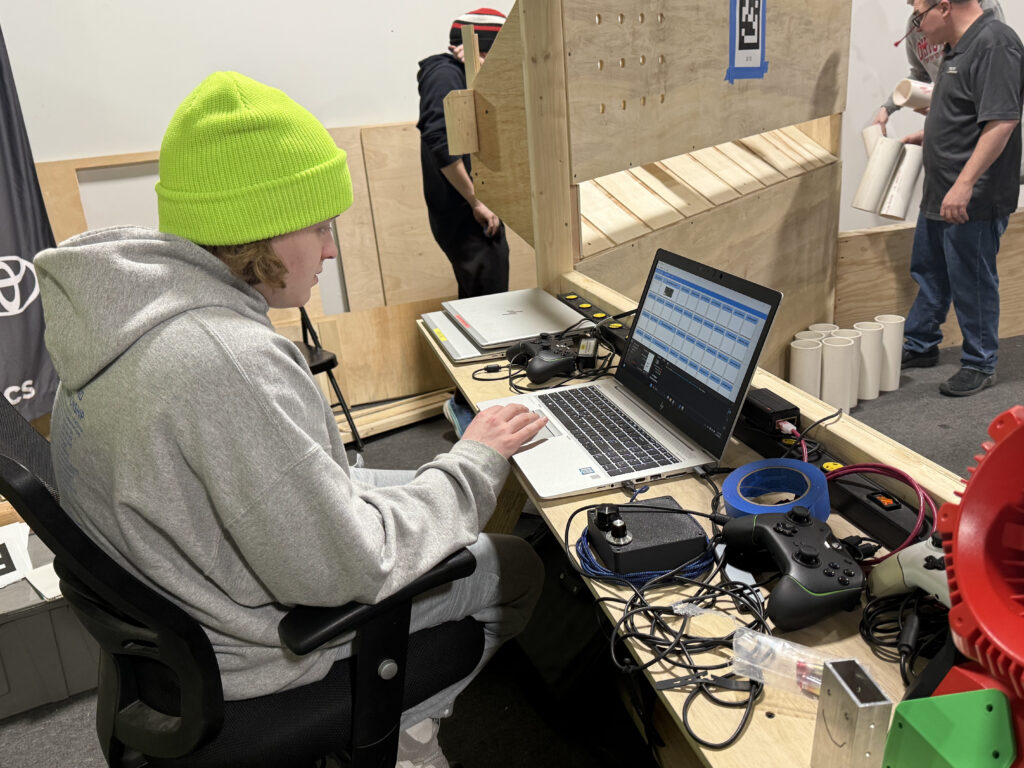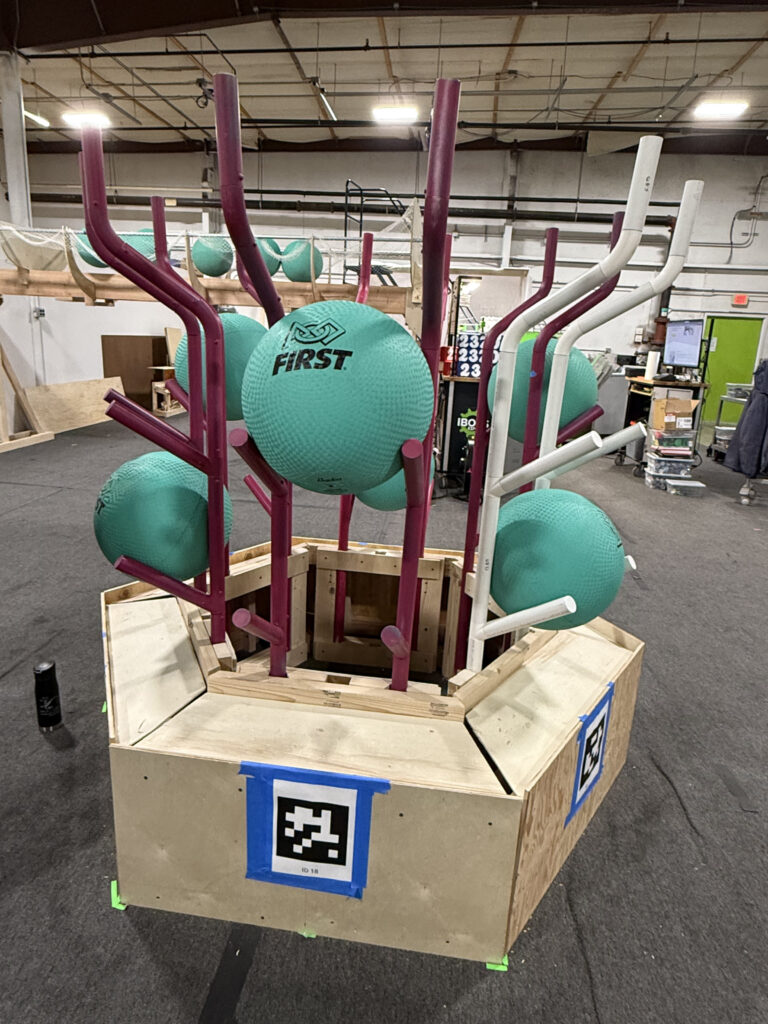By James Kent
In a region better known for its mountains than its machines, a team of high school students is proving that rural Vermont is embracing STEM in a major way. Team 2370, known as The IBOTS, is part of Rutland Area Robotics, and this past weekend, they headed to Springfield, Massachusetts, for their first competition of the season in the FIRST Robotics Competition (FRC). But this story is more than just robots—it’s about teamwork, problem-solving, and opening doors to higher education and career opportunities in science, technology, engineering, and math.
Each year, FIRST Robotics challenges teams worldwide to design, build, and program a robot that can complete a unique game. This year’s competition, themed around an underwater ecosystem, requires robots to retrieve and hang PVC pipe onto pegs of varying heights to earn points. At the IBOTS testing site on location at the Rutland MINT, onsite mentor Dan Roswell, who has been with the team since 2008, explained the challenge.
“Every January, we get a new game. We have about eight weeks to design and build a robot that can play it. This year, teams must navigate ‘algae’ obstacles while placing the PVC pipes on scoring pegs.”
Rutland’s IBOTS is one of just nine Vermont teams among 210 competing in New England, making their achievements all the more impressive. Last year, they reached the FIRST Championship in Houston, Texas, competing among the top 600 teams globally and finishing fourth in their division.
“It was pretty unbelievable,” Roswell said. “There’s no money or prizes—it’s all about the glory. But the real prize is the college and career opportunities these kids gain.”
From STEM to scholarships
Beyond competitions, FIRST Robotics teams have access to millions of dollars in STEM scholarships, and one in four students who apply receive funding. Colleges actively recruit students from FRC teams; competitions often double as college fairs. “They’ll talk with the dean of engineering, tour campuses, and connect with industry leaders. It’s an incredible way for them to get noticed,” Roswell said.
For Jacob Jepson, the team’s driver and programming lead, the experience has shaped his future ambitions. A Mount Saint Joseph Academy sophomore, Jepson has been involved in FIRST Robotics for over five years. “We compete at WPI every year, and I’d love to go there for software or robotics engineering,” he said.
For Jackson Singsen, a junior at Rutland High School, joining IBOTS was a dream come true. “I’ve loved making things since I was a kid,” he said. “This team is everything I love—building, designing, and problem-solving.” He has his sights set on MIT or Embry-Riddle Aeronautical University to pursue engineering. And while Singsen recognized that an institution such as MIT could seem far-reaching, his time with the IBOTS has already taught him that nothing is impossible if you work hard and put your mind to it.
Meanwhile, senior Finian Smathers, head of mechanical fabrication and pit crew lead, has built his college applications around his decade-plus of FIRST experience. “I won the Dean’s List Award at our district event, which got me into a luncheon at FIRST Championships where we met admissions reps from MIT, Purdue, WPI, and more,” he said. He’s still waiting on responses from several schools, but his top choice is the University of Toronto, which he hopes to receive word on later this spring.
A high-stakes, high-intensity competition

Jacob Jepson prepared to take the IBOTS robot for a practice run.
Robotics competitions aren’t just about building a machine—they require strategy, adaptation, and teamwork. Jepson, who has been the IBOTS’ driver for two years, explained the fast-paced nature of competition: “Last year’s game was about shooting projectiles, but this year we’re doing pick-and-place tasks. We’ve been practicing non-stop, and I think we’ve got a real shot.”
Behind the driver, a pit crew works like an F1 race team, repairing damage and making on-the-fly modifications between matches. Singsen described the problem-solving aspect: “We prototyped three different designs before settling on this one. One of mine exploded spectacularly, but that’s how it goes. You learn, rebuild, and keep improving.”
Smathers emphasized the unpredictable nature of competition. “What can go wrong will go wrong. We have to be prepared for everything—mechanical failures, software issues, unexpected rule changes. But that’s the challenge, and that’s what makes it fun.”
The March 14-17 weekend event in Springfield is just the beginning. The IBOTS will compete in three regional events, including Vermont’s first-ever FRC event at UVM on March 28-30. If the IBOTS perform well, they could once again qualify for the New England District Championship and, ultimately, a return trip to the FIRST Championship in Houston.
STEM education that lasts a lifetime
Beyond competitions, Rutland Area Robotics fosters career connections. Many IBOTS alums have interned or gone on to work at local Vermont tech companies, including GE Aerospace, Hubbardton Forge, and Casella Waste Systems, some of which sponsor the team. “It’s like NASCAR,” Roswell said. “You’ve got a pit crew, a driver, and a scouting team. It’s more than just building robots—running a business, managing time, working as a team. And these are skills that last a lifetime.”
With a new season ahead, Team 2370 – The IBOTS is ready to take on the challenge. As they head into their first competition, they carry the excitement, knowledge, and ambition that could propel them to the FIRST Championship stage once again.
For more information or to support the team, visit: rutlandarearobotics.org.

The IBOTS built an entire mock-up of this year’s FIRST Robotics Competition game arena in order to practice their robot. In this obstacle, the robot must place PVC tubes onto the metal rungs, and remove the balls in the way.



